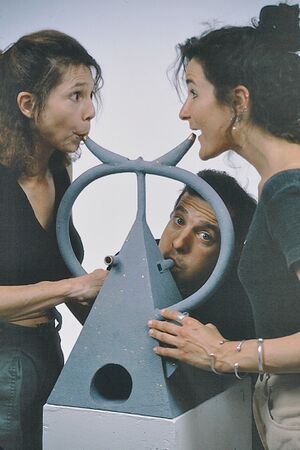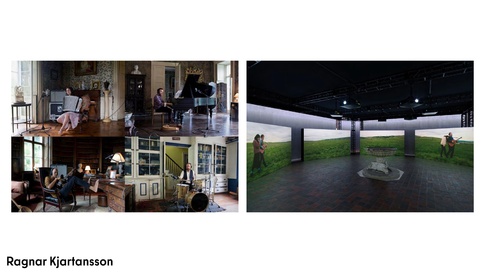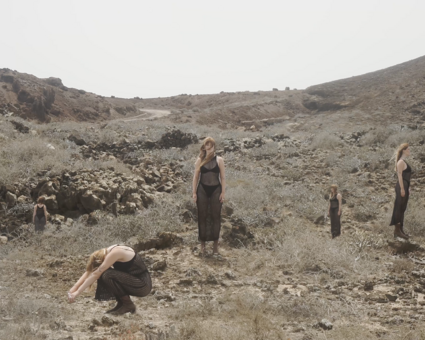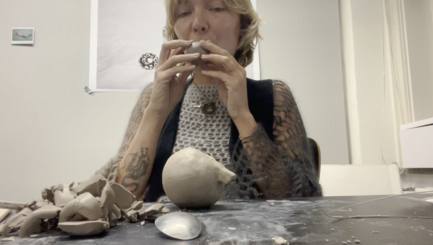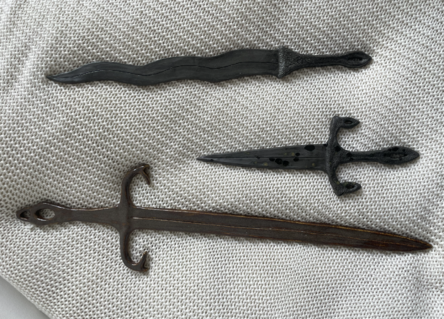Clara Thesis Outline & Proposal": Difference between revisions
| Line 2: | Line 2: | ||
== '''PROPOSAL''' == | == '''PROPOSAL''' == | ||
''A musical collaborative performance with ceramic instruments'' | ''A musical collaborative performance with ceramic instruments'' | ||
Revision as of 20:00, 12 November 2023
How can I visualize a reciprocal relationship between humans and nature, by exploring the sonic capabilities of clay as both research medium and outcome?
PROPOSAL
A musical collaborative performance with ceramic instruments
What?
I will create two video pieces and an interactive installation that center around a ceramic musical altar.
The first short film of approximately 5-10 minutes will be documenting the creation of ceramic instruments from the extraction of the clay, to the shaping, burning, glazing and final instruments.
The second video will be a one-shot performative short film of approximately 15 minutes in which the instruments will be used by myself and another musician on the location where the clay has been extracted. This film will center around a “musical altar” consisting of the self made ceramic instruments.
Lastly the ceramic piece itself will be exhibited, so it can be interacted with by the visitors.
Here are some visual insights into my search for references and my first try outs.
How?
Step 0: Continue reading in different directions such as object oriented ontology and examples for reciprocal relationships between humans and land (Currently reading Braiding Sweetgrass by Robin Wall Kimmerer) in order to specify my research.
Step 1: Make ceramic instrument trials. Possible instruments include; flute, marimba/xylophone, hanging plates/chimes, shaker, bells, water whistle, drum, guiro. I will document the process through film and photography. Film this whole process
Step 2: Start collecting clay and try to create instruments with such. Also film this whole process.
Step 3: Create video performances in collaboration with my close friend and collaborator in many ways Mila. This can be filmed in a location where I collected clay.
Step 4: Possibly create one meditative loop song that I will create a music video to.
Why do you want to make it?
Coming from a multidisciplinary background I have devised a way to combine my interests and skills in lens based work, ceramics, and musical performance.
One of my learnings of the past 5 years spend in art school has been the appreciation of objects from the perspective of a crafter, understanding and appreciating the virgin material and the path it had to take in order to take on a new shape and be usable to humans.
This project gives me the chance to visualise this process of gratitude focussed production methods, with an underlying anti-capitalistic thought, as it visualises the emotional disconnect that has grown between consumers and goods. My aim is to promote ideas of a symbiocene and reciprocal relationships between humans and the land we inhabit.
The musical part of this project comes from many influences throughout my upbringing in a very musical family and my ongoing collaborations as a lens based artist with musicians, as right now with my friend Mila Meijer. Together we are currently producing several music videos for the EP of the duo MIEL that she is part of. As this project in currently ongoing next to my studies and I am greatly enjoying working with her it felt natural to bring her influence on me into this project as well.
Having felt very touched by Ragnar Kjartansson's works "The Visitors" and "Death is Elsewhere", the want to include a musical aspect to my graduation project became stronger.
Who can help you?
Musically I will have support through my sister(music therapist) and mama(choir conductor) and my friend Mila(musician and frequent collaborator).
When it comes to ceramics, I am reaching out to two fellow WDKA students; Laura, who is learning a lot about natural glazes at the moment and Dori, who is already working with ceramic instruments. I am also reaching out to artists that work with clay that they have collected themselves. The potterer Claußen in Brunsbüttel works with clay out of the Wadden sea and the recent WDKA graduate Rink Schelling works with clay from Zeeland.
I am also planning to visit the Soundlab at the ceramics center EKWC, close to Tilburg. Possibly support can be found there.
Relationship to previous practice
These applied disciplines have been in my practice for some time. I grew up in a very musical family and embraced my inner stage pig through flute playing, classical singing, ballet and contemporary dance.
Now I sometimes create little tracks with my mother and her wild selection of instruments at home. Her choir has become my second family, underlining my idea of music as a community builder as it has build one for me since birth.
Over the last years I have increasingly worked with musicians in my lens based practice as well. Usually making music videos or taking images at performances. In the last few years one main collaborator has been Mila or rather the duo MIEL in that sense. Currently working on several music videos for their upcoming album, we are slowly turning into a trio, where visual arts merge into the process of musical creation.
Ceramics came into my life around 2 years ago, having taken a course in Barcelona at the end of 2021. The obsession has been growing steadily, making functionable ceramics, but also more sculptural ones such as crowns and swords. Instrument making is a new one to me. Ceramics came into my life around 2 years ago, having taken a course in Barcelona at the end of 2021. The obsession has been growing steadily, making functionable ceramics, but also more sculptural ones such as crowns and swords. Instrument making is a new one to me.
Another constant in my practice has been to continuously accumulate new skills in crafts. This practice of learning how to craft clothing from virgin and upcycled material or clay objects for daily usage for example, has strengthened my anti-capitalistic ideas of consumption. Crafting has taught me to enjoy slow processes and cherish the pride and energy I carry with objects created by myself or people I feel any sort of relation to.
Inspiring friends to also create or create side by side has also been a fulfilling aspect of these learnings.
Friendships and community, acts of socialising have been present in most of my work. From my photobook on the community that I lived in in Groningen(The ORKZ), to my photographic and film work centering around friendships and shared experiences. Another example for that is the short film I have made on my friend Amber.
Relationship to larger context
A big spark towards this project has come from Ragnar Kjartanssons works “The Visitors” and “Death is Elsewhere”. An artist I have found inspiring, that is using interactivity and live music in an installation is Nevin Aladag. Her “Music Room” installation focuses on the idea of historical, recreational music rooms. The performance piece by Wang Lu and Polly Apfelbaum called “The Sound of Ceramics” should also be mentioned. It brings together vocals and using ceramic pieces hanging in the space as instruments.
Instrument builders that have caught my eye so far have been Harry Partch (working with microtonal scales), Susan Rawcliffe (focus on hispanic inspired flutes) and Marie Picard (ceramic instruments in playful animal designs) and Gemma Luz Bosch (installations with ceramic instruments).
In ceramics work I have been also looking more into the work of Mel Arsenault, who is creating organically shaped altars from clay.
Musicians that I find inspiring are Erykah Badu, Marc Rebillet, Laura Misch (loop machine-multi-instrumentalist) and the song “Give peace a chance” by Yoko Ono and John Lennon that originated in their bed-in protests for peace. This could be a potential visual reference.
When it comes to the research, ideas such as object-oriented ontology and ecofeminism play a big role.
Currently two books that I am reading are also of great importance to base my ideas on human-nature relationships that aim to become symbiotic and reciprocal; Robin Kimmerer (Braiding Sweetgrass) and Alice Vincent (Rootbound).
Workflow/timetable
Now-February: Research through reading and making instruments
February-May: Video experimentation with the instruments
May-June: Editing and experimenting with medium for presentation (film installation/physical objects/interactivity/live performance/print images)
OUTLINE
Introduction
Immersing my hands in a soft body of clay I forget about the concept of time until my back reminds me of the duration of my doing.
Intuitively stroking the material until desired softness of corners the shapes become an extension of my own self, each object very distinctively recognisable as my hands' collaboration with the material.
I don’t necessarily wish to become a professional potterer, but what I do know is that I wish to take every chance possible to return to the ceramics workshop to geek out with other clayheads on the new things the clay has taught us and are eager to share with the others.
I have devised a way to combine my interests in lens based work, ceramics, and musical performance to try and answer following question;
How can I visualize a reciprocal relationship between humans and nature, by exploring the sonic capabilities of clay as both research medium and outcome?
This I plan to do by creating a musical altar, consisting of self made ceramic instruments from self extracted clay.
The final result is as of right now imagined as an installation consisting of two video pieces and the altar itself, which the visitors may interact with.
One video piece will take the viewer through the process of creation of the instruments and the second video will be a ritualistic musical performance with the instruments at the location of clay extraction.
Why Clay?
I started increasingly working with clay during the last year of my undergraduate degree at the Minerva art Academy in Groningen. Learning and messing up plenty, my usually impatient self wouldn't stop for partially 7 hours at a time.
I went on to take a turntable course in Barcelona, impatiently waiting each week until I could go to my class with the calm handed, attractive, tattooed teacher Antonio again, his playlists always hitting the spot. Firstly it started by watching him in the almost sensual act of centering a 500 gram piece of clay, a slurping soundscape while continuously changing the shape from a phallic tower to a flat blob. Once I was able to center and pull up the walls of a future cup with his help, it was time to wait until the piece was what is called leather hard.
“Un poco más!” Would be one of his typical comments in the next step of the process, tapping slightly on the vessel I was creating, listening to the sound of the hollow body. Once the sound became almost like a drum, it was time to stop cutting down and leave the little creation to dry and wait for its next step. Baking, glazing, baking, and after 4 weeks in total I would finally hold my first own cups. Oh, the joy. Of course every piece but one would be gifted proudly to family members for Christmas a month later.
That last one, my favorite, was a cup accidentally twirled around by the spinning table. A beautiful asymmetrical mistake, reminding me of its organic origin and handmade qualities.
Once I glazed 20 cups accidentally with non-water resistant glaze for my friend's coffee shop in Groningen. I learned a lot and after 1 year built up the courage to pick up the molding cups again to try to reglaze them. And managed!
Glaze stuck to the kiln, completely melted pieces that I accidentally put in the wrong temperature oven and many more mistakes would follow. Many explainable, many frustrating, but all full of lessons.
Creating many cups, vases, plates, swords, crowns, and now instruments, I can hardly use a mass produced ceramic piece with pleasure.
Always feeling that there is more to tell with this practice other than through simply making beautiful goods and gifts for my loved ones, I see a possibility in creating instruments to give a voice to my teacher; clay.
Now, if clay could speak, what would it tell us?
Why sound/music?
What do we intuitively do when calming down a crying infant?
A dramatic scream for help, followed by rhythmic bouncing of the little body combined with a calming humming or lullaby, possibly for both sides to cope with the outburst of emotions.
My sister recently gave birth to a little girl called Svea, and I watched family members humming and singing to this little creature to calm her down. Simply very wholesome and a beautiful reminder of the power of our voices and music in general.
I can thankfully say that I come from a musical family, in which it is normal to sing songs on Christmas day in 4-part harmony (not to the excitement of all 10 cousins) and have jam sessions and choir rehearsals in our living room. A room hosting probably 100 instruments, a playground which I sadly only started to appreciate when I moved out, classic.
My sister recently became a certified music therapist and my mother spends much of her free time drumming in the Greenpeace percussion group, practicing with her folk music band or conducting a choir that she started almost 30 years ago. My father and aunt are members as well and I love listening to my papa practicing the bassline of songs.
In my parents house one will often hear a humming or whistling melody, coming from the vocal cords of my papa. Melodies, sometimes familiar, sometimes seemingly random.
My sister and I have been observing this behavior with the assumptious conclusion that this is his way of relieving stress too.
Recently on the phone with her, while brainstorming on this project, my mama stated: “if I wouldn't make music in these times, I think I would be an addict. I would be drinking, I would take drugs.” This woman has never touched drugs, except for alcohol and nicotine in her life. And even if she might be slightly over exaggerating, you get the point.
So basically I have plenty of examples in my family for how sonic experiences can be used in various ways to socialize, therapize, protest or connect to each other. Not just the hippies understood music as a medium to strengthen political movements through music and build a community based on pacifistic ideals.
When words don’t do justice anymore, the internationally understood language of music can soothe us with its vibrations, and literally decrease blood pressure and levels of cortisol.
Now, if clay could sing, what would it sing to us? A cry for help? An angry aria? A calming lullaby?

